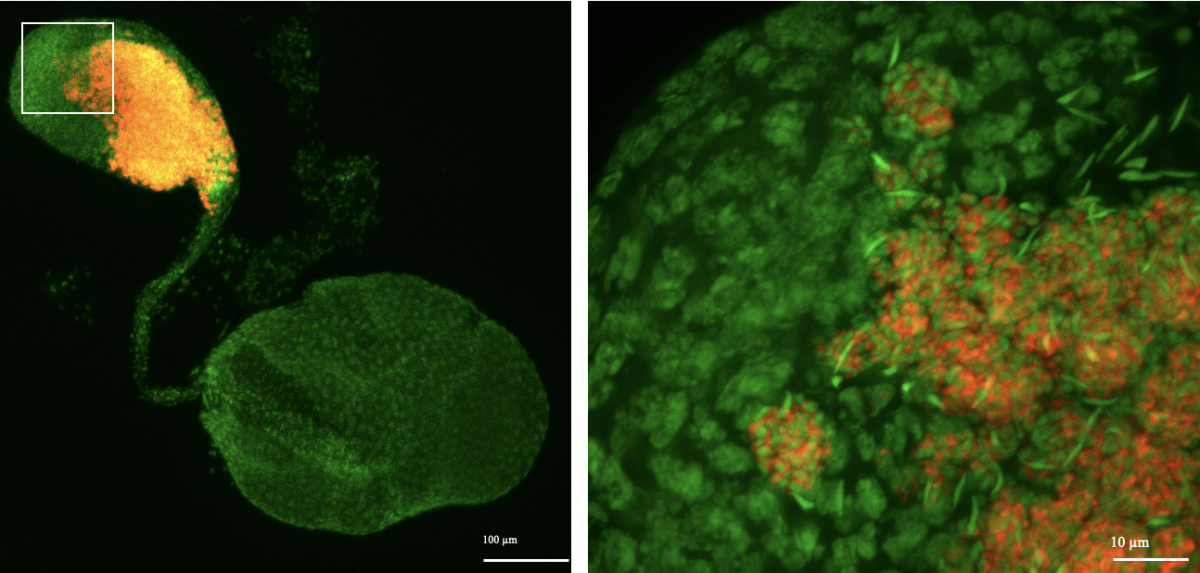New grant for malaria transmission blocking research
Researchers from the International Centre of Insect Physiology and Ecology (www.icipe.org) have been awarded a USD 3 million grant by Open Philanthropy (www.openphilanthropy.org), to advance pioneering research on a microbe that is capable of blocking transmission of the disease from mosquitoes to people, as an effective and sustainable way to control malaria.
In early 2020, icipe researchers and partners made the groundbreaking discovery of a microbe, which they named Microsporidia MB, in Anopheles mosquitoes. The researchers established that mosquitoes carrying Microsporidia MB do not harbour malaria parasites either in nature, or after experimental infection in the laboratory. Studies by icipe and partners have demonstrated that Microsporidia MB can spread through mosquito populations by mother to offspring and via sexual transmission. (See: http://www.icipe.org/news/malaria-transmission-blocking).
“We found the microbe, which is a distant relative of fungi, occuring naturally inside the cells of the malaria transmitting Anopheles mosquitoes in parts of Kenya. By studying the ways through which it is propagated between mosquitoes, we believe we can develop a tool to efficiently spread the microbe through mosquito populations, thus limiting their ability to infect people with the parasite that causes malaria,” explains Dr Jeremy Herren, and leader of the research.
The recent support by Open Philanthropy builds on a previous USD 2.2 million grant by the organisation to icipe in 2020, which enabled the scientists to investigate how Microsporidia MB can be spread between mosquitoes.
“The additional resources will enable us to commence a new phase to investigate the feasibility of implementing Microsporidia MB in different regions with varying malaria intensity. We will also aim to understand how this strategy could be integrated with other mosquito and malaria control methods. This knowledge will lay the foundation for field trials,” adds Dr Tullu Bukhari, Scientist, icipe.
The malaria disease burden remains a major impediment to good health and economic development in many regions of sub-Saharan Africa. In 2022, there were approximately 249 million cases reported, which resulted 608,000 deaths, a nearly 6% increase since 2019. Particularly alarming is the continued high burden of the disease in Africa. The African region disproportionally bore the brunt of the malaria burden in 2022, accounting for 94% of global malaria cases and 95% of all malaria deaths. Altogether this is a strong indication that current control measures and their deployment levels are insufficient.

Notes for Editors
Open Philanthropy (www.openphilanthropy.org) identifies outstanding giving opportunities, makes grants, follows the results, and publishes its findings. Its mission is to give as effectively as it can.
The International Centre of Insect Physiology and Ecology (www.icipe.org): headquartered in Nairobi, Kenya, is the only research institution in Africa working primarily on insects and other arthropods. The Centre conducts world-class science, and then translates this knowledge into innovate environmentally friendly, affordable, accessible and easy to use solutions to tackle crop pests and disease vectors. icipe’s role also extends to the conservation and sustainable exploitation of the beneficial insect biodiversity. Thus, icipe works through the 4Hs Themes – Human Health, Animal Health, Plant Health and Environmental Health – a holistic and integrated framework that has sustainable development as its basis, to improve food security, health and the overall well-being of communities in Africa. We gratefully acknowledge the support of icipe core donors: the Swedish International Development Cooperation Agency (Sida); the Swiss Agency for Development and Cooperation (SDC); the Australian Centre for International Agricultural Research (ACIAR); the Norwegian Agency for Development Cooperation (Norad); the German Federal Ministry for Economic Cooperation and Development (BMZ); and the Government of the Republic of Kenya. The views expressed herein do not necessarily reflect the official opinion of the donors.

